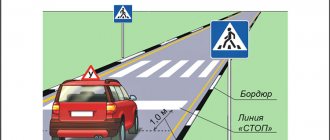Cargo transportation related to the transportation of substances classified as hazardous is strictly controlled and regulated by law. The thing is that, unlike ordinary cargo, hazardous substances, if the carrier deviates from the established standards, in the event of an unforeseen situation, will not only be able to cause enormous harm to the direct carrier of the product and bystanders, but also become the primary source of a global catastrophe that threatens the environmental situation, health, and often the lives of people.
There is a fine for violating the rules for transporting dangerous goods.
State standards oblige the cargo carrier’s legal documentation to ensure the maximum level of safety for the transported goods, and to issue special permits for the transit of products. For non-compliance with safety and lack of obligatory documentation, the cargo carrier is subject to significant penalties. In this article we will talk about the circumstances under which a fine is imposed for the transportation of dangerous goods by road, and we will consider the legal documents that oversee the transportation of unsafe categories of goods.
Laws defining standards for the transportation of exhaust gases
Unsafe products, regardless of their hazard class, are not prohibited by law from being transported. The only condition for transporting dangerous goods is that they are transported in accordance with the standards established by law, which ensure that unforeseen situations are kept to a minimum. To understand what liability a cargo carrier faces for violating the rules for transporting hazardous substances, it is necessary to familiarize yourself with the regulations relating to the transportation of products in this category.
The fundamental regulation coordinating the movement of dangerous goods is Article 12.21.2 of the Code of Administrative Offenses of the Russian Federation in the latest edition of the code dated May 2021. The document stipulates the penalties provided for non-compliance with certain rules for transporting harmful substances by road. Cargo transportation of exhaust gases by other modes of transport, with the exception of automobiles, is sanctioned by articles of the code 11.14 and 8.19. Additionally, legal standards can be adjusted by auxiliary domestic standards approved at the legislative level. These may be orders, annexes or regulations that regulate the correct organization of the movement of substances of a specific type.
Judicial practice under Article 12.21 of the Code of Administrative Offenses of the Russian Federation:
Decision of the Supreme Court: Determination N 84-O09-30 dated May 14, 2009 Judicial Collegium for Criminal Cases, cassation
Decision of the Supreme Court: Determination N 205-AD16-1 of 05/18/2016 Judicial Collegium for Military Personnel, Supervision
Supreme Court decision: Resolution No. 46-AD12-18 of 10/05/2012 Judicial Collegium for Administrative Cases, supervision
Decision of the Supreme Court: Determination N 84-DP11-4 dated July 20, 2011 Judicial Collegium for Criminal Cases, supervision
Decision of the Supreme Court: Resolution No. 14-AD17-2 of 05/03/2017 Judicial Collegium for Administrative Cases, supervision
Decision of the Supreme Court: Determination N VAS-11142/13 dated 08/26/2013 Collegium for Administrative Legal Relations, supervision
Supreme Court decision: Resolution No. 5-AD16-250 of November 18, 2016 Judicial Collegium for Administrative Cases, supervision
Decision of the Supreme Court: Resolution N 205-AD16-3 of May 24, 2016 Judicial Collegium for Military Personnel, Supervision
Comments ()
Write a comment
Responsibility for illegal movement of exhaust gas
Sanctions for transporting dangerous goods if their movement does not comply with established rules vary depending on the type of violation. If the cargo carrier’s documentation is not officially documented, or the transit is carried out with incomplete compliance with all the rules established by law, responsibility for the incident may be assigned to the driver, the company implementing the transportation, or the customer of the services. The legislation provides for the following types of penalties for transporting exhaust gases in violation of transportation rules:
- financial penalty in the form of a fine;
- confiscation of property: mainly the vehicle and transported products;
- a ban on driving a specific type of vehicle for a period prescribed by law;
- criminal penalty.
The traffic police will be able to fine you for transporting dangerous goods on highways in an improper manner, and the fines will vary depending on the seriousness of the offense. Not only the entity directly transporting the goods, but also the goods transport company, as well as a legal entity authorized to control the transit delivery of products will be responsible for the incorrect movement of dangerous goods.
Section 12.21.2 of the code provides for the following financial penalties associated with the absence of certain papers or violation of the technical regulations:
- The absence of papers required for the transportation of unsafe substances provides for a fine in the range of one hundred to one hundred and fifty thousand in national currency for the direct carrier, from five to ten thousand units for the official entity. In this case, the trucking company may be punished for a larger amount, starting from one hundred and fifty thousand, with the upper limit of the accrual reaching two hundred and fifty thousand rubles. These penalties are applicable only in the absence of documents that are not licensing approvals, for the lack of which the punishment has more stringent parameters.
- If the violation concerns traffic regulations, then the penalties are two and a half, twenty and five hundred thousand rubles for the driver, official and company, respectively.
- Deviations from generally accepted requirements for the technical condition of vehicles transporting unsafe goods are punishable by a fine of thirty to fifty thousand rubles, and the sanction is applied to the entrepreneur who is the owner of the vehicle. Additionally, officials and legal responsible persons may be fined up to thirty and one hundred thousand rubles, respectively.
Basic rules for transporting goods
According to general rules, when transporting any cargo you must be guided by the following requirements:
- It is important to secure the load well. If during movement it falls on another vehicle, the truck driver involved in transportation will have to answer for this;
- The load must be secured in such a way that it does not interfere with the stability of the transport. If its weight does not meet the vehicle standards, you need to choose another, more lifting equipment;
- It is not allowed to transport large cargo that blocks the driver’s view and interferes with the overall control of the vehicle;
- The load must not be allowed to cover license plates, turn signals, or lighting devices;
- The load must not interfere with others;
- The luggage being transported must not protrude beyond the edges of the vehicle by more than 1 meter. If its length exceeds the specified value, it is necessary to mark the load with a special sign, and at night, additional lights and reflectors are installed;
- If the cargo extends more than 2 meters from the edge of the vehicle, transportation is not allowed. An alternative option is to coordinate transportation with the traffic police, located at the starting address of the route;
- The maximum restriction on the width of luggage is 2.55 m. If the width of the transport itself is less than the specified value, but the cargo protrudes no more than 40 cm, there is no need to install special signs. In other cases, identification signs are hung on the front and back; at night, you will need to install reflectors and lights.
If the truck belongs to the category of long vehicles and its length exceeds 24 m, a permit from the traffic police must be issued. It must also be marked with a special identification sign along the route.
For all categories of vehicles transporting goods, there is a speed limit of 60 km/h. It is important to observe it, because trucks always have longer braking distances, and in an emergency they pose a high danger to other road users at high speed.
Sanctions for transportation of exhaust gases in the absence of documentary permission
To transport exhaust gas, it is necessary to have a package of documents that indicate the legality and safety of road transportation. Let's consider what fine for transporting dangerous goods without standardized approvals, state licenses and legal permits will be imposed on the contractor and the customer of transportation, as well as directly on the driver driving a vehicle with substances of an unsafe class. The driver transporting exhaust gas must have the following documents with him:
- driver's license, which provides the ability to operate a certain type of transport;
- route sheet, certified by authorized persons and filled out in accordance with established standards;
- access to a vehicle used during transportation;
- emergency card, which indicates all the nuances of handling transported substances and information about their hazard class, regulations for handling them;
- waybill;
- ADR is a European standard approval authorizing the possibility of transporting special products by an authorized person.
The last document is a permit issued in the name of the direct carrier of dangerous goods, which confirms his preparedness in the field of working with products of unsafe categories of certain classes.
Transportation of goods of a dangerous category without permission from the European Standard cannot be carried out and is punishable. ADR certifies that the driver has completed a training course on the specifics of handling a certain category of substances. Failure to obtain permission to transport hazardous gases in the form of admission will provide for the following penalties:
- A driver acting on behalf of an employer, working without ADR, will be fined by the relevant authorities in an amount, the upper limit of which is two and a half thousand rubles.
- A transport organization specializing in the delivery of exhaust gases will be punished with a fine, which starts at four hundred thousand, while the upper limit of the penalty can be five hundred thousand rubles.
- The official entity responsible for dispatching the disputed flight may be subject to an administrative penalty, ranging from fifteen to a maximum of twenty thousand rubles.
Similar sanctions are provided for by law if it is revealed that the vehicle in use does not have documents permitting its use for the purpose of transporting exhaust gases, the vehicle is not equipped with information and emergency signs, or it is not intended for transporting products of an unsafe category.
How to avoid transportation fines?
To avoid receiving a fine from a traffic police officer or a notification by mail, you must carefully read all the rules for transporting goods before sending. The law clearly states how and what kind of cargo must be transported correctly, and if the owner does not violate these rules, then no claims will be brought against him.
It is important to pay attention to the set of all necessary documentation, which includes: permission to work with certain types of cargo, information about the vehicle, waybill.
Situations involving criminal penalties
For violation of the rules for the transportation of dangerous goods, the legislation provides not only administrative, but also criminal liability. Such situations are possible when aggravating circumstances exist, causing significant harm or the presence of factors that accompany an increased risk of harm to people or the environment. First of all, the legislation classifies as an aggravating factor the fact that the driver is intoxicated while driving when transporting exhaust gas. In such a situation, the executive authorities will be guided by the standards set out in Article 264, parts 4 and 6 of the Criminal Code, which provide for the following penalties for violators of the law:
- A person who provoked a precedent in which at least two people died could face up to nine years of arrest.
- A driver is threatened with restriction of freedom if he fails to comply with the requirements for the transportation of exhaust gases or traffic regulations, if the result is a fatal situation in which one person was injured. Based on the presence or absence of minor aggravating circumstances, the term can start from two years of arrest and reach seven years of imprisonment.
- The legislation provides for four to nine years of arrest for a person who provoked a situation causing harm to people, if the precedent does not record fatal cases. The period varies in this situation depending on the number of victims and the extent of damage caused to their health.
The Criminal Code of the Russian Federation in Chapter 264, Part 1 also provides for criminal punishment for a driver transporting substances of a dangerous category in an alcoholic state, even if no critical situations were recorded during transportation in the form of an accident or other precedents causing harm to the environment or people. If a driver is “caught” driving while drunk, and the precedent is not primary, he may be punished with a financial penalty of up to two hundred thousand rubles, or ordered to be detained for a period of up to twenty-four months.
The Criminal Code also provides for more severe penalties than fines for transportation in the following situations:
- Pollution of water space or land resources is punishable under sections 250 – 252 and 254 of the Criminal Code of the Russian Federation, respectively.
- For road transportation of environmentally unsafe products, during which damage to the natural environment is caused, punishment is sanctioned by Article 247.
- Illegal transportation of weapons or explosive products is punishable by law in accordance with Article 222 of the Criminal Code of the Russian Federation.
- Illegal import or export of goods used for the production of weapons of large-scale destruction and other similar products is regarded as a criminal offense and implies liability under Article 189.
The situations described above are considered criminal offenses; the criterion for punitive measures will be established by the relevant structures depending on the presence of aggravating factors, the degree of harm to the ecological environment, the presence and number of victims.
Let's sum it up
Road transportation of goods of a specific category is an activity that requires a responsible attitude both to the transportation of products itself and to the preparation of relevant documentation. Penalties for transportation of exhaust gases that do not comply with the rules are quite strict, and the goods transport company suffers the most in such situations. To avoid problems with executive bodies and reduce the likelihood of violations, the company must enlist the support of experienced specialists who will be able to professionally supervise the transportation of exhaust gas, timely prepare the relevant documentation, and select driving personnel of a decent level.










